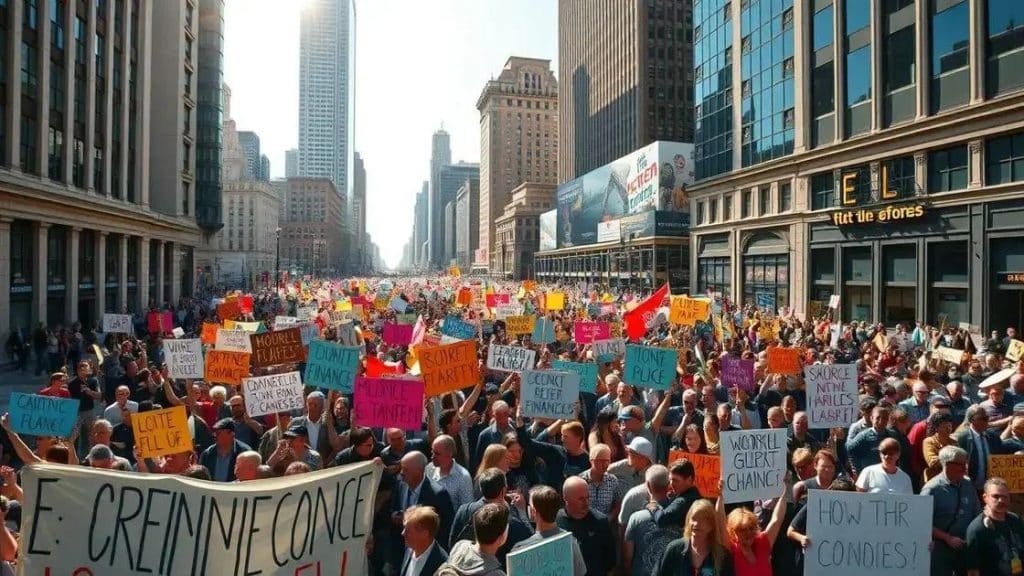Economic reform protests dominate Liberation Day 2025

Anúncios
Eeconomic reform protests dominate Liberation Day 2025, highlighting citizens’ demands for justice, social equity, and significant changes in government policies to address critical economic and social issues.
Economic reform protests dominate the observances of Liberation Day 2025, reflecting deeper societal issues and the push for change. Have you felt the impact of these movements in your community? Let’s dive into what this means.
Anúncios
Background of Liberation Day
The background of Liberation Day is rich with history and significance. This day marks an important moment of freedom and transformation for many nations. It is essential to understand how this day came to be and the various struggles that led to its celebration.
Historical Context
Liberation Day commemorates the effort and sacrifices made by countless individuals who fought for freedom. Over the years, the narrative around this day has evolved. It symbolizes hope, resilience, and a commitment to a better future.
Anúncios
Key Events Leading to Liberation Day
Several pivotal events shaped the path to liberation. These include:
- Protests and Movements: Grassroots movements that demanded change and justice.
- Alliances: Forming coalitions among different groups to push for reform.
- Political Changes: Shifts in leadership and policy that created a path towards liberation.
Understanding these milestones helps to appreciate the significance of the day fully. The struggles faced were not just about political freedom but also about social and economic rights.
Celebration of Liberation Day
Each year, communities come together to honor this day with various festivities. These celebrations include parades, speeches, and cultural events that reinforce the values of freedom and democracy. It’s a time for reflection and a reaffirmation of the spirit of resistance that led to liberation.
As we observe Liberation Day, it’s crucial to remember the ongoing challenges that many still face and the reforms that are needed. The history of this day serves as a reminder to stay vigilant and committed to ensuring that freedom is not just celebrated, but actively pursued.
Significance of economic reform

The significance of economic reform is paramount in ensuring a stable and prosperous society. Economic reform not only revamps the existing structures but also addresses pressing issues that affect people’s everyday lives.
Why Economic Reform Matters
Economic reform plays a crucial role in enhancing the quality of life for citizens. It helps to create jobs, foster innovation, and reduce poverty. When governments implement reforms, they can lead to healthier economies and improved public services.
Key Benefits of Economic Reform
Some of the primary benefits that come from economic reform include:
- Increased Investment: A reformed economy attracts both foreign and domestic investments.
- Job Creation: Reforms often lead to new businesses and industries, generating employment.
- Better Resource Allocation: Changes in policy ensure that resources are used more efficiently and effectively.
- Social Equity: Addressing inequalities through reforms helps to uplift marginalized communities.
Through these benefits, economic reform establishes a foundation for more equitable growth. Understanding its importance can motivate citizens to support necessary changes in policy.
Moreover, economic reform provides the tools needed to navigate challenges like inflation and unemployment. As economies evolve, so must the strategies that govern them. Continuous adaptation and reform are essential for long-term sustainability and resilience. These reforms can empower citizens, ensuring that everyone contributes to and benefits from economic growth.
Key events during the protests
Significant key events during the protests have shaped the landscape of social movements. These events not only bring attention to pressing issues but also unify people in the fight for change.
Major Protests and Their Impact
Across the nation, several large protests have taken place, each marking a moment of solidarity among citizens. These gatherings have often been sparked by specific incidents, leading to a surge in activism and awareness.
Examples of Key Events
Some pivotal events that stand out include:
- Initial Spark: A controversial policy led to the first large-scale protest, igniting widespread discontent.
- Mass Mobilization: Following the initial protest, community organizations rallied support, leading to even larger gatherings.
- Solidarity Marches: Cities across the country witnessed solidarity marches, showcasing unified demands for change.
- Engagement with Leaders: Protests often included dialogues with local leaders, pushing them to address concerns directly.
These events illustrate how protests can rally communities and pressure authorities for reform. Each gathering serves as a reminder of the power of collective voices aiming for justice. Additionally, protests provide a platform to raise awareness about economic reform and social issues affecting everyday lives.
As protests continue, they reflect a growing demand for accountability and transparency. The momentum built from key events often leads to legislative discussions and potential policy changes, emphasizing the role of grassroots movements in shaping society.
Future implications of the protests

The future implications of the protests are vast and significant. These movements not only reflect the current social climate but also pave the way for change in the years to come. Understanding these implications is essential for grasping how societal shifts occur.
Long-term Changes in Policy
One of the most notable outcomes of protests is the push for systemic reforms. As voices amplify in the streets, policymakers often feel the pressure to respond. This can lead to changes in legislation that reflect the demands of the people.
Social Awareness and Engagement
Protests have a unique ability to raise social awareness, bringing issues to the forefront of public discourse. As communities engage in these movements, more individuals become aware of their rights and the significance of civic participation.
- Increased Participation: More people are motivated to participate in future elections and civic duties.
- Community Building: Protests foster a sense of community, uniting individuals over shared goals.
- Education on Issues: Participants often research and educate themselves on the issues at hand, creating an informed citizenry.
These changes can lead to a ripple effect, encouraging even more individuals to advocate for social justice and reform. The cycle of awareness and action continues to expand, making civic engagement a powerful tool for driving change.
Moreover, as protests gain media attention, they often attract international scrutiny. This attention can pressure governments to uphold human rights and address the grievances of the populace. The global eye on local protests can amplify demands for justice, leading to significant consequences for governments.
As we contemplate the future, it becomes clear that the ongoing dialogue initiated by these protests is crucial. The engagement seen today not only influences immediate policies but also instills a culture of advocacy among newer generations.
In conclusion, the protests for economic reform have sparked a vital conversation about the future. They not only highlight the present issues but also lay the groundwork for meaningful changes ahead. As communities come together, their collective voices demand accountability and pave the way for a more equitable society. The lessons learned from these movements can inspire future generations to remain engaged and advocate for their rights, ensuring that the fight for justice continues. Together, these efforts can transform societies and create a brighter future for all.
FAQ – Frequently Asked Questions about Economic Reform Protests
What are the main reasons for the economic reform protests?
The protests primarily focus on issues like unemployment, income inequality, and demands for better public services.
How do these protests influence government policies?
Protests create public pressure, prompting lawmakers to address the issues raised and implement necessary reforms.
What role does social media play in these protests?
Social media amplifies awareness, mobilizes supporters, and helps share real-time information and updates about the protests.
How can individuals participate in supporting economic reforms?
Individuals can join peaceful protests, engage in community discussions, and support organizations advocating for change.





